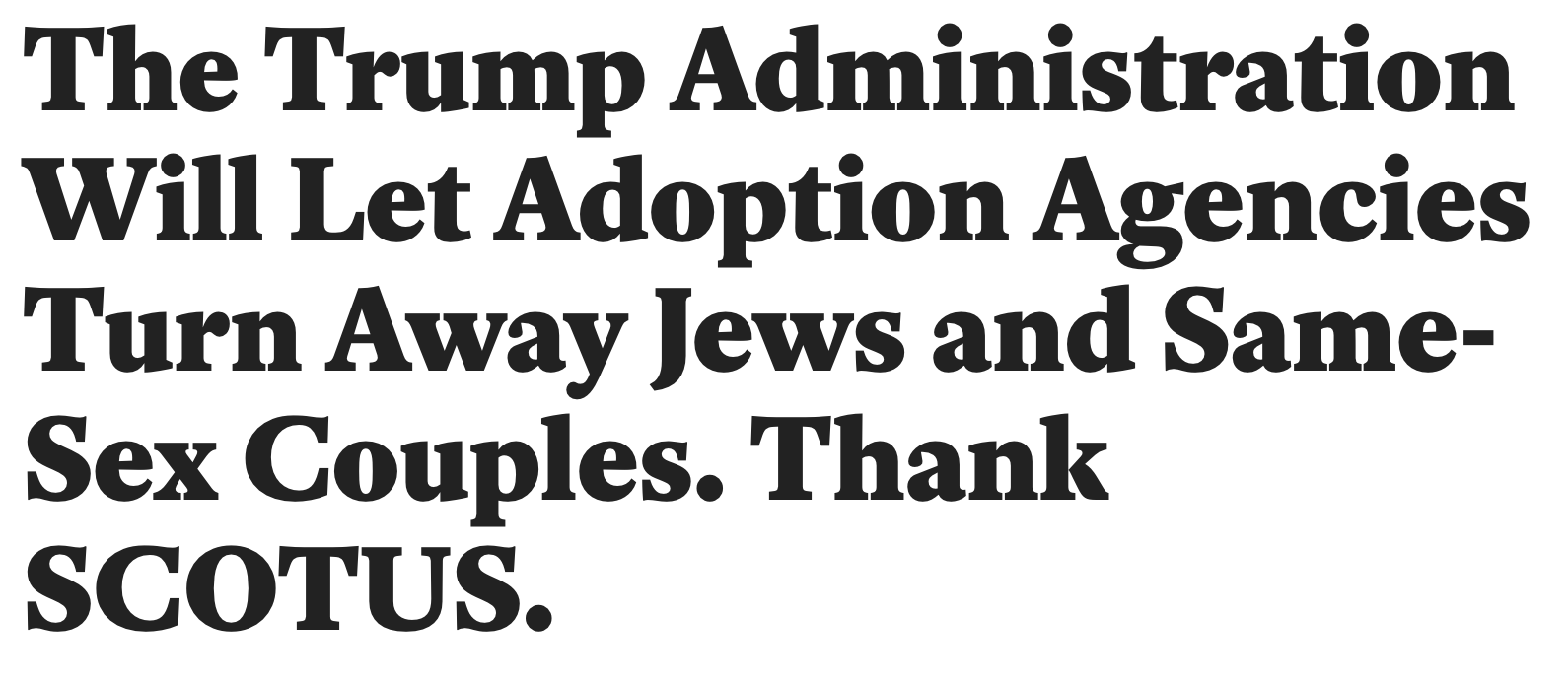
The above headline comes from a recent online article at Slate, detailing how current court interpretation of the US’s 1993 Religious Freedom Restoration Act (RFRA) have resulted in a situation in which claims of religious freedom are increasingly enabling people to sidestep laws that yet others have long taken for granted.
Most recently it involves the following case (quoting from the article):
In a decision of startling breadth, the Department of Health and Human Services declared that, under RFRA, a federally funded foster care agency in South Carolina has a right to discriminate against non-Christians, closing its doors to would-be parents of different faiths. As [Supreme Court Justice Ruth Bader] Ginsburg predicted [in her dissent from 1993’s Burwell v. Hobby Lobby], the administration’s interpretation of the law has no limiting principle: It all but announced that taxpayer-funded adoption and foster care agencies may now engage in flagrant discrimination without consequence, so long as they state a religious rationale for their actions.
For the student of religion this moment provides a useful illustration of how the category religion, used as part of a philosophically-idealist discourse (which sees practices and associations as inspired and motivated by non-empirical, internal states called belief, experience, and faith) functions in modern liberal democracies. The case would therefore repay careful examination, as a specific case study in modern governance.
For here we find the long-used idea that the usually all-encompassing power of the modern nation-state is limited in its jurisdiction when it comes to people’s expression in practice of what are now portrayed in law as their sincerely-held beliefs.
I say long-used because, as is evident from the US Constitution, the government’s ability to infringe on its citizens’ free exercise of their religious beliefs has been curtailed right from the founding of the republic — and thus we arrive at what many now take as the common practice of not taxing certain institutions and activities so long as they are designated by the Internal Revenue Service as religious or as a church. Many other religious exemptions exist to US laws, of course (such as the ability to decline a vaccination or even the ability to have a beard in the military) — indicating that many people currently take for granted that the state should not intervene in certain aspects of the individual’s life. (Should it have what is called a compelling interest the state can, of course, argue successfully in courts to withhold the exemption.)
But, lacking a legal definition of religion — an absence either to be criticized or, perhaps, acknowledged as providing the government with incredibly useful wiggle room in its decisions and actions — how widely can such exemptions be applied…?
So the question is what happens when those who dissent from some of the nation’s practices (such as those disagreeing with recent legalization of same sex marriage) use this very tradition of religious privilege to assert their interests against the state’s action? This is the moment in which we now find ourselves in the US: when a taken-for-granted limitation on government is being extended to practices that some would rather not see exempted.
But, of course, yet others would.
So, as I said above, for the scholar of religion, this is a rich example. For, unlike those with practical interests inhibited by either a narrow or a broad readings of the RFRA (and thus those who either praise or criticize each governmental action in this arena), the scholar of religion is in the position to examine the relationship between acts of governance, at specific sites, and acts of classification that involve labeling something religious, not to mention the designation “sincere”; for, as far as I understand it, there is no agreed upon test for sincerely despite it being continually evoked, in almost a ritual manner, in courts as a way to authorize certain claims (for example, see the link, above, to the federal decision on the South Carolina religious exemption case for an adoption agency, the one that is now in the news). But being substantively empty doesn’t mean that the term is not consequential, of course — and figuring out how this all works is the challenge that a scholar of religion can tackle.